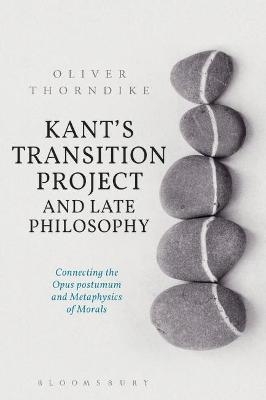
Kant’s Transition Project and Late Philosophy
Bloomsbury Academic (Verlag)
978-1-350-12314-4 (ISBN)
Labelled by Kant as the “Transition Project”, the Opus postumum generates debate among commentators as to why Kant describes the project as filling a “gap” within his system of critical philosophy. This study argues for a pervasive transition project that can be traced through Kant’s entire critical philosophy and is the key to addressing current debates in the scholarship.
By showing that there is not only a Transition Project in Kant’s theoretical philosophy but also a Transition Project in his practical philosophy, it reveals why an accurate assessment of Kant’s critical philosophy requires a new understanding of the Opus postumum and Kant’s parallel late writings on practical philosophy. Rather than seeing Kant’s late thoughts on a Transition as afterthoughts, they must be seen at the centre of his critical philosophy.
Oliver Thorndike is Lecturer of Philosophy at Loyola University, Maryland, USA.
Acknowledgements
Preface
Introduction
Part I: What Philosophical Problem Does the Transition Project of the Opus postumum Address?
Introduction
Kant’s philosophia naturalis
The systematic function of the "General Remark to Dynamics"
Alternative accounts of the Transition Project
The schematism of the Transition Project
The "Octaventwurf" and the "Early Fascicles" of the Opus postumum
Conclusion
Part II: Why is a Transition Project in Practical Philosophy Required?
Introduction
Mundus Intelligibilis and Mundus Sensibilis
A priori foundation and empirical open-endedness of ethics
Casuistry and ethical eonflict
Kant’s alleged rigorism
Conclusion
Part III: Kant’s "Aesthetics of Morals"
Introduction
The four mediating concepts in the "Aesthetics of Morals"
Implications
The unfinished Metaphysics of Morals and the Opus postumum
Conclusion
Part IV: Conclusion
Bibliography
Index
| Erscheinungsdatum | 08.01.2019 |
|---|---|
| Verlagsort | London |
| Sprache | englisch |
| Maße | 156 x 234 mm |
| Gewicht | 399 g |
| Themenwelt | Geisteswissenschaften ► Philosophie ► Geschichte der Philosophie |
| Geisteswissenschaften ► Philosophie ► Philosophie der Neuzeit | |
| ISBN-10 | 1-350-12314-5 / 1350123145 |
| ISBN-13 | 978-1-350-12314-4 / 9781350123144 |
| Zustand | Neuware |
| Haben Sie eine Frage zum Produkt? |
aus dem Bereich


